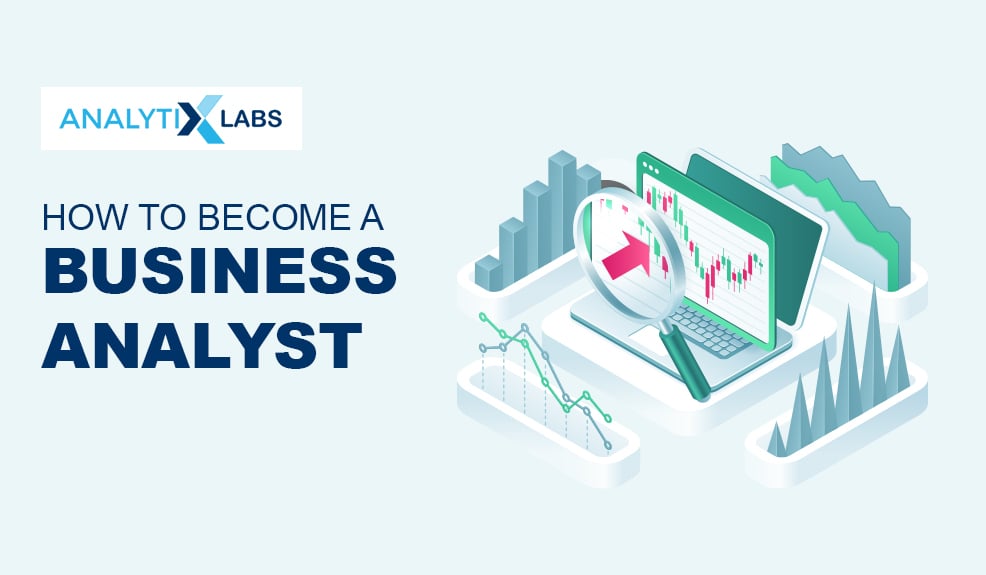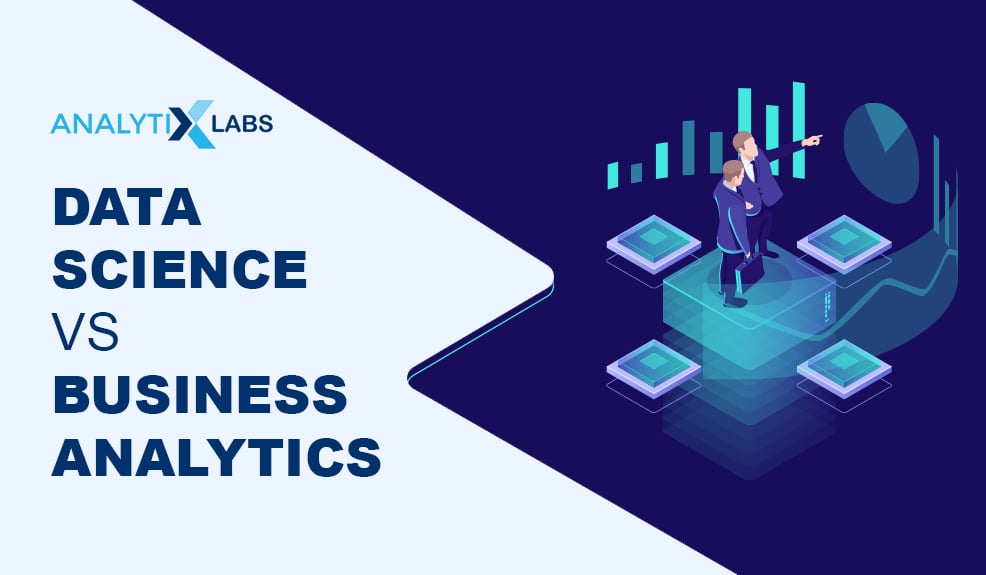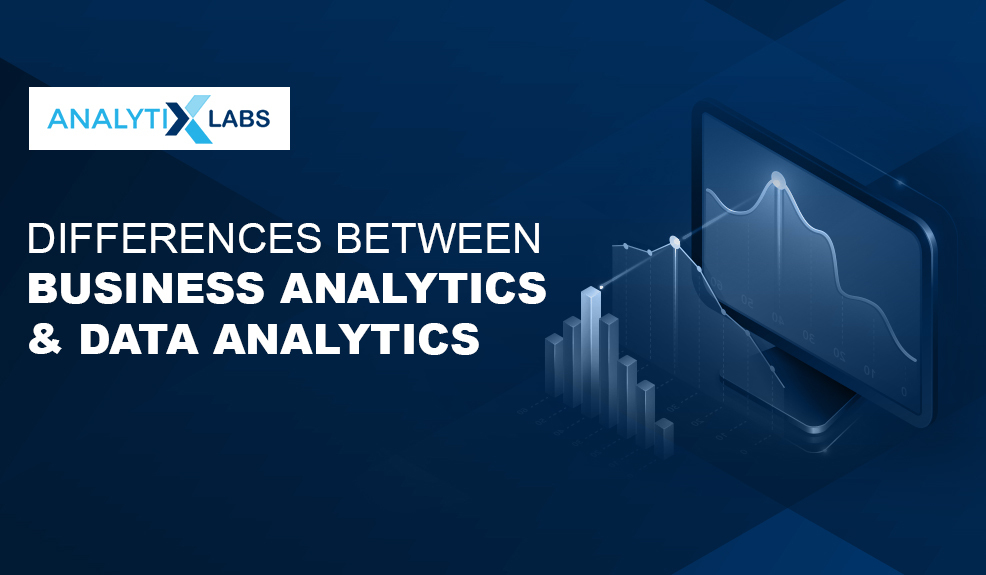There are some fundamental differences between Data Analytics and Business Analytics, though both hold their own importance. For example, to discover patterns and observations that are ultimately used to make informed organizational decisions, Data Analytics includes analyzing datasets. On the other hand, to make realistic, data-driven business decisions, Business Analytics focuses on evaluating different kinds of information and making improvements based on those decisions. In this blog, we discuss their individual benefits and areas of expertise in more detail. Data Analytics vs. Business Analytics attracts a lot of interest from budding analysts; we will take multiple factors into account and help explain the difference between data analytics and business analytics.
Explore our Business Analytics 360 course and join us for experiential learning that will transform your career. Check out our upcoming batches or book a free demo with us. Also, check out our exclusive enrollment offers
Difference between Data Analytics and Business Analytics
Data Analytics uses statistical and/or logical methods systematically applied to explain, demonstrate, condense, recapture, and analyze data. The term ‘Data Analytics’ refers to the practice of analyzing databases to conclude the data they contain. Data analytical techniques allow you to take raw data and discover patterns to derive useful insights.
Now to answer what is Business Analytics, we need to understand it as a practice of driving a company’s realistic, data-driven changes. It is a practical application of statistical analysis which focuses on the provision of actionable advice. In this area, analysts concentrate on how the information they obtain from data can be implemented.
Business Analytics vs. Data Analytics is something where multiple factors should be considered, like a requirement, operation type, attached project, and data. They have separate or complementary applications in individual fields of operation and have fundamental requirements from specific data management purposes; hence, Business Analytics vs. Data Analytics is hard to make.
Let’s learn about the job profile of Data Analytics vs. Business Analytics.
Who Is a Data Analyst?
The basic role of a Data Analyst is to analyze and explain data that empowers corporate leaders to make smarter, more educated choices. Therefore, a Data Analyst must be well versed in a variety of data analytics methods and tools.
The job responsibilities of a Data Analyst revolve around data extraction, manipulation, and analysis using basic to advanced analytics that includes descriptive and productive analytics. She/ He is also expected to be versed with Data visualization tools like Tableau and PowerBI. All in all, it is about analyzing the data and generating actionable insights.
Who Is a Business Analyst?
The duty of a Business Analyst is to use data to support or make strategic business decisions.
If we want to compare business analytics vs. data analytics, we must check the work profile. The key difference lies in what they do with data. To help companies make more efficient business decisions, Business Analysts use data. On the other hand, Data Analysts are more interested in collecting and evaluating information for the organization to analyze and use to make decisions independently. The difference between Data Analyst and a Business Analyst is quite clear, and the job profile contains different responsibilities in extensively different spheres.
Related: What Does a Business Analyst Do? Their Roles & Responsibilities
How to Become a Business Analyst?

There are a few standard protocols to becoming either a business analyst or a data analyst. Here are the requirements for Business Analytics vs. Data Analytics.
To be a Data Analyst,
- Earn a bachelor’s degree with a major in mathematical and analytical abilities, such as mathematics or computer science
- Gain skills in data analytics
- Consider certifying
- Get your first Data Analyst position at the entry-level
- Earn a master’s degree in information processing for further improvement
To be a Business Analyst,
- Get business management, finance, or accounting undergraduate degree
- Gain exposure to business analysis at a company or institute
- Become certified and join a company as a business analyst
- Acquire an advanced credential or a master’s degree for further progress
There are some separate basic skillset and expertise requirements for Data Analytics vs. Business Analytics. Let’s delve deeper into the skills required for data analytics vs. business analytics.
You may also like to read: How to Become a Business Analytics Professional? Salary, Skills, Courses
Data Analyst Skills
Data analysts must possess the technical skills required for data mining, sanitation, interpretation, and good interpersonal skills to convey their results to decision-makers to be successful in their positions.
A data analyst must be proficient in the fundamentals of programming, linear algebra, and computer science—some examples of projects in data science range from creating and customizing office management systems and custom emails.
A data analyst must be proficient in data visualization and presentation skills, Microsoft Excel, and Organized Query Language (SQL). In addition, python, Keras, R, Scikit-learn, and PyTorch are the common tools of a data scientist, and Statistics, Deep Learning, Machine Learning, CV, and NLP are the most commonly used techniques.
You may also like to read our latest post on Data Analyst Salary in India
Business Analyst Skills
Critical thinking, problem-solving, communication, and process management are key skills required to become a good business analyst. In addition, such professionals need to have a firm understanding of the priorities and procedures of their company so that they can assess results, recognize inefficiencies, and suggest and enforce solutions.
Does business analytics require coding? While the need for hard technical skills is typically lower than for data analysts, business analysts must have a working knowledge of the technologies involved in analytics. However, having advanced knowledge of mathematics, computer science, and analytics will serve as a major differentiator in the job market for those looking for career development opportunities.
Professionals in Business Analytics must be qualified to present business simulations and business planning. Analyzing market patterns will be a great part of their position, for example – Web analytics/pricing analytics.
So, does business analytics require coding after all? Not extensively, but the fundamental knowledge of certain programs does help. Tableau, Excel, SQL, and Python are some of the methods used extensively by business analytics. Forecasting, Statistical Methods, Predictive Modeling, and Storytelling are the most widely used techniques.
Related: Best Ways To Learn Business Analytics | Courses & Free Resources
Data Science vs. Business Analytics

Considering the different tasks, there are some specifications and limitations of both Data Science and Business analytics.
- While Business Analytics is the statistical analysis of business data, Data Science is the science of data research using statistics, algorithms, and technology.
- Data Science is a relatively recent creation in the field of analytics, whereas Business Analytics has been in use since the late 19th century.
- A person with data science expertise can practice business Analytics, but not vice versa.
- The findings of data science research cannot be used in the company’s day-to-day decision-making, though Business Analytics is critical in key decision-making by management.
- Data Science utilizes both unstructured data and structured data, while mostly structured data is used for Business Analytics.
Data Science vs. Business Analytics is a prevalent comparison to do among budding analysts. Data scientists do not come across a lot of bad data, although business analysts do. Also, data science relies heavily on data availability, although business analytics does not. Investing in data science costs is high, while business analytics costs are low. So, Data Science vs. Business Analytics is a tough decision to make.
You may also like to read in detail: Data Science Vs. Business Analytics; Do You Know the Difference?
Difference Between a Data Scientist and Business Analyst
Business Analyst vs. Data Scientist is a favourite topic of those who are aspiring to pursue either of the two roles.
The functional requirements that inform IT system design is provided by business analysts. Data scientists derive significance from the data generated and processed by such systems. Data scientists may also simplify the activities of the company analyst and may also be able to provide some of the market insights.
The job profile and responsibilities of a Business Analyst vs. Data Scientist are extensively compared and researched upon.
How to Choose Between Data Scientist and Business Analyst?
This truly depends on whether one wants to be more involved with the implementation of the results gathered with the data, or this is a question of if, as an analyst, one wants to be involved in the technical side of things and handle the raw data.
The difference between analysis and analytics or MIS vs. Business Analytics is quite interesting as well. If we talk about the difference between analysis and analytics, analytics is a huge field where analysis is just a component of analytics. Choosing between MIS vs. Business Analytics is quite easy. Business analytics is the practice of using many tools and software to follow, read and interpret data and MIS just being a tool for data or information management.
You may also like to read: The Differences Between a Business Analyst & a Data Analyst
FAQs – Frequently Asked Questions
Q1. Can a Data Analyst become a Business Analyst?
Yes, technically, a Data Analyst can switch over to the role of a Business Analyst. However, vice versa would prove to be a problem with a lack of coding and machine language knowledge.
Q2. Who earns more, Business Analyst or Data Analyst?
Business Analysts tend to earn a higher average annual salary of $75,575(Source). You may also like to read more about “Career as a Business Analyst in India – A Beginner Guide.”
Q3. What is the difference between Business Analyst and Data Analyst?
Business analysts focus on data’s broader business ramifications and the decisions that should result from them.
To reveal patterns and trends, draw conclusions about theories, and help business decisions with evidence-based insights, data analysts help work on merging large datasets.
Q4. How data is used in Business Analytics?
Data will help companies understand their clients better and increase efficiency in operations. Although raw data has many potentials, to truly use the data, you need business data analytics.
We truly hope you find our article interesting and informative! Please post your queries and share your opinions below to attend to your query or help you out. To choose a suitable job-oriented Business Analytics and Data Analytics Courses for your profile, you may get in touch with us.
You may also like to read:
1. Types of Business Analytics – Types of Analytics With Examples
2. 10 Data Analytics Tools for Everyone | Beginner to Advanced Level
3. Business Analytics vs. Business Intelligence- What’s the Difference?








